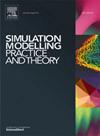交通信号控制中协同多智能体强化学习中的通信策略分析:基于仿真的研究
IF 3.5
2区 计算机科学
Q2 COMPUTER SCIENCE, INTERDISCIPLINARY APPLICATIONS
引用次数: 0
摘要
在智能交通系统中,交通信号控制(TSC)是一个重大挑战,并已通过多智能体强化学习(MARL)来解决。虽然集中式方法对于大规模TSC问题通常是不切实际的,但分散式方法提供了可伸缩性,但引入了新的挑战,例如部分可观察性。在分散式MARL中,通信起着至关重要的作用,agent必须通过消息交换信息来更好地理解系统并实现有效的协调。已经应用了深度MARL,其中多个交互代理共享一个公共环境。然而,许多针对TSC提出的深度MARL通信策略允许代理与所有其他代理通信并共享全局状态。这可能导致系统噪声并降低整体性能,因为由于通信延迟,实时全局信息共享是不切实际的。本文采用基于仿真的方法来评估基于协同深度q网络(Co-DQN)的各种信息共享策略对提高系统整体性能的有效性。模拟实验结果表明,缺乏适当的共享策略来提供对真实状态的代表性观察,似乎比底层流量模式的变化对性能的影响更大。本文章由计算机程序翻译,如有差异,请以英文原文为准。
Analyzing communication policies in cooperative multi-agent reinforcement learning for traffic signal control: A simulation-based study
Traffic signal control (TSC) poses a significant challenge in intelligent transportation systems and has been addressed using multi-agent reinforcement learning (MARL). While centralized approaches are often impractical for large-scale TSC problems, decentralized approaches offer scalability but introduce new challenges, such as partial observability. Communication plays a crucial role in decentralized MARL, as agents must exchange information through messages to understand the system better and achieve effective coordination. Deep MARL has been applied, where multiple interacting agents share a common environment. However, many proposed deep MARL communication policies for TSC allow agents to communicate with all other agents and share global state. This can contribute to system noise and degrade overall performance since real-time global information sharing is impractical due to communication latency. This paper employs simulation-based approaches to assess the effectiveness of diverse information-sharing strategies to enhance overall system performance based on Cooperative Deep Q-Network (Co-DQN). Simulation experiment results suggest that the lack of a suitable sharing policy to provide a representative observation of the real state appears to affect performance more drastically than changes to the underlying traffic patterns.
求助全文
通过发布文献求助,成功后即可免费获取论文全文。
去求助
来源期刊

Simulation Modelling Practice and Theory
工程技术-计算机:跨学科应用
CiteScore
9.80
自引率
4.80%
发文量
142
审稿时长
21 days
期刊介绍:
The journal Simulation Modelling Practice and Theory provides a forum for original, high-quality papers dealing with any aspect of systems simulation and modelling.
The journal aims at being a reference and a powerful tool to all those professionally active and/or interested in the methods and applications of simulation. Submitted papers will be peer reviewed and must significantly contribute to modelling and simulation in general or use modelling and simulation in application areas.
Paper submission is solicited on:
• theoretical aspects of modelling and simulation including formal modelling, model-checking, random number generators, sensitivity analysis, variance reduction techniques, experimental design, meta-modelling, methods and algorithms for validation and verification, selection and comparison procedures etc.;
• methodology and application of modelling and simulation in any area, including computer systems, networks, real-time and embedded systems, mobile and intelligent agents, manufacturing and transportation systems, management, engineering, biomedical engineering, economics, ecology and environment, education, transaction handling, etc.;
• simulation languages and environments including those, specific to distributed computing, grid computing, high performance computers or computer networks, etc.;
• distributed and real-time simulation, simulation interoperability;
• tools for high performance computing simulation, including dedicated architectures and parallel computing.
 求助内容:
求助内容: 应助结果提醒方式:
应助结果提醒方式:


